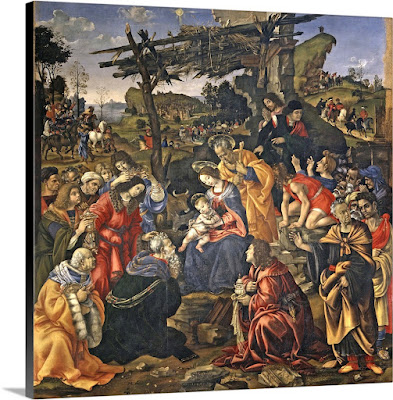 |
Adoration of the Magi (Adorazione dei Magi), by Filippino Lippi, 1496, 15th Century |
As this year’s Christmas season comes to an end and we enter the celebration of the Epiphany we are reminded that Wise Magi from the east brought precious gifts to honour the coming of Jesus. They were able to recognize that a new era and way of life was unfolding for Jews and foreigners alike. In faith, hope and celebration they represent an historic movement toward peaceful transformation so the world could truly become ‘all one people.’
Today, I am thinking about theologian, Anglican Archbishop Desmond Tutu, who passed away on Sunday, December 26th, 2021. His funeral was on New Years’ Day in Cape Town, where his eulogy has become a beacon of hope in the years to come. We were reminded of his many gifts to humanity for he courageously forged new pathways for peace and justice.
Extreme political and cultural forces met at a crossroads during his lifetime. Tutu’s joyful countenance and hope filled perspective in the face of adversity, became a light in the darkness. Demonstrating Christ consciousness, Tutu was a life-long activist leading non-violent opposition for the oppressed who were struggling for freedom and equality. He openly declared, “I am a man of peace, but not a pacifist.” These words seemed antithetical but took on a deeper meaning when I was fortunate to hear a prisoner, who spent years on Robben Island, share what it was like to live through the atrocities of the dark times of apartheid, willing to risk his life to create change in an unjust world.
I was teaching in Windsor Ontario, and regrettably no longer remember the messenger’s name. But I still remember his passion that as a survivor he was on a mission to declare that we are never alone when faced with severe hardship. He told us what it was like to be a black political prisoner being housed at Robben Island with thousands of others including Nelson Mandela. He also spoke of Tutu’s ministry and his ability to deeply listen to the pain revealed in their stories. He said many prisoners were able to recognize their own internal wisdom and turn to deepening their relationship with God. This guidance helped give them strength to endure the hardships of intense mental and physical torture that was condoned at this notorious prison.
Tutu’s diminutive physical stature belied his powerful voice of conscience, eventually becoming a moral compass in the fight for justice. The movement gained momentum and in 1994, after Nelson Mandela was elected the first President of South Africa, he appointed Tutu as lead chair of the Truth and Reconciliation Commission. After being governed for 50 years under South Africa’s oppressive laws of apartheid, Desmond Tutu echoed the Gospels to help usher in a new era of discernment and healing saying, “Without forgiveness, there is no future.” Deep understanding of the teachings of Jesus was embodied as Tutu sat at the head of the table, influencing dramatic cultural and political change.
As Mandela and Tutu were both men of deep faith and vision, we are reminded that their influence went beyond the boundaries of South Africa. Both earned Nobel Peace Prizes by promoting ideals of interconnectedness, racial reconciliation, and equality. Their leadership helped to slay apartheid and turn the tide of deeply entrenched cultural bias. However, it was not going to be an easy transition. As the country worked through the trials and tribulations of becoming a democratic state Tutu continuously drew attention to any newly elected leader’s shortcomings that relied on traditional forms of aggression
Throughout his life, Tutu worked passionately in many other campaigns for justice and human rights. He acted upon his values of inclusivity and began ordaining women priests. Despite controversy, he was also vocal in causes for the LGBT community such as same sex marriage and the rights of gay priests. As the first Black Archbishop of Cape Town, his courage put him at odds with many across the world including opponents in the Anglican Church. In 2013 he said, I am as passionate about this campaign [LGBT rights] as I ever was about apartheid. For me, it is at the same level.” Tutu is also quoted as saying, “If you are neutral in situations of injustice you have chosen the side of the oppressor.”
We are continuously reminded that democratic principles based on legal equality continue to evolve with threats from all directions. Renewed ways of thinking and peacefully interacting with one another must be adopted for our survival. There is hope for Tutu’s voice was not lost in the wilderness. He steadfastly helped to lead a national movement that was recognized and respected world-wide in the non-violent struggle for justice and peace.
As I reflect on the gifts of the Magi who were foreigners to the Jewish people, Archbishop Desmond Tutu’s legacy is a modern-day treasure. He lived on the other side of the world from me, demonstrating how to live in a universe of possibilities. In these times that continuously echo chaotic divisiveness, all of humanity has been reminded that there is a pathway that lies beyond the violent illusion for earthly power over others. As Jesus did 2000 years before, Tutu taught us how to live our lives by peacefully and steadfastly walking in accompaniment as companions on a journey. We have truly been blessed and hopefully we will live long enough to witness a new age of transformation.
Resources: Many news outlets including:
https://time.com/6131665/desmond-tutu-obituary-south-africa

No comments:
Post a Comment